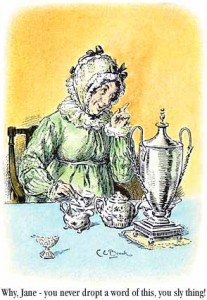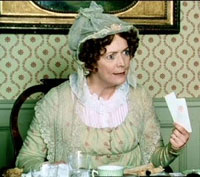And happy Mother’s Day to all the mothers reading this. I thought I’d share a blog originally published at Heroes & Heartbreakers for Mother’s Day 2011.
 Mothers don’t often fare well in Jane Austen’s world. In fact, many have been buried by the time we meet their offspring. Emma Woodhouse’s mother has been long gone by the time we meet her managing younger daughter and, as Persuasion begins, Lady Elliot is a mere memory to poor Anne, left to contend with her self-involved father and sisters.
Mothers don’t often fare well in Jane Austen’s world. In fact, many have been buried by the time we meet their offspring. Emma Woodhouse’s mother has been long gone by the time we meet her managing younger daughter and, as Persuasion begins, Lady Elliot is a mere memory to poor Anne, left to contend with her self-involved father and sisters.
Of the living, in Mansfield Park, Fanny Price’s slatternly mother has sent her off to live with her aunts and uncle, most of whom see her as unpaid help (if they see her at all). In Sense and Sensibility, poor Mrs. Dashwood is deprived of her entailed home and comfortable income after the untimely death of her husband and goes to live in a cottage where she pretty much gives over the role of caretaker to Elinor, her eldest daughter.
Catherine Morland appears to have a loving and reasonable mother (a rarity among Austen mothers), but we don’t see much of her. She sends her daughter off with friends to visit Bath and then to Northanger Abbey. When, later, Catherine is unceremoniously dumped in a coach and sent home in the middle of the night, Mrs. Morland greets her with open arms and puts her expulsion from the abbey in the best possible light
“Well,” continued her philosophic mother, “I am glad I did not know of your journey at the time; but now it is all over, perhaps there is no great harm done. It is always good for young people to be put upon exerting themselves; and you know, my dear Catherine, you always were a sad little scatter–brained creature; but now you must have been forced to have your wits about you, with so much changing of chaises and so forth; and I hope it will appear that you have not left anything behind you in any of the pockets.”
This Mothers’ Day, however, we are sending flowers to Pride and Prejudice’s Mrs. Bennet of Longbourn, mother of five daughters, possessor of frayed nerves and querulous arguments, future mother-in-law to Fitzwilliam Darcy.
“Why?” you ask. Why send flowers to Mrs. B? She’s one of the most annoying creatures in all of Jane Austen’s novels, an assessment with which her long-suffering husband would probably agree.
Had Elizabeth’s opinion been all drawn from her own family, she could not have formed a very pleasing picture of conjugal felicity or domestic comfort. Her father, captivated by youth and beauty, and that appearance of good-humour which youth and beauty generally give, had married a woman whose weak understanding and illiberal mind had very early in their marriage put an end to all real affection for her. Respect, esteem, and confidence had vanished for ever; and all his views of domestic happiness were overthrown.
Yes, that Mrs. Bennet, the best mother in all of Jane Austen’s novels. Sure, she’s not the brightest candle in the chandelier. I imagine her voice to be like Alison Steadman’s in the 1995 Pride and Prejudice (the one with Colin Firth): high and screechy. She’s enough to drive her husband to the library with his glass of claret, and she makes the more intelligent of her daughters wince. Yet, she’s a mother who has the interests of her children at heart.
In a time when the state of women was inextricably tied to their husbands and in a household where there was not sufficient money for reasonable dowries for five girls, and living in an estate that will go to a distant cousin on the death of her husband, Mrs. Bennet wants to get her girls married and married well. How else can she take care of them?
Mrs. Bennet assumes that Mr. B. will pop off before she does, although he reassures her, “My dear, do not give way to such gloomy thoughts. Let us hope for better things. Let us flatter ourselves that I may be the survivor.”
She doesn’t get a lot of support from that quarter. Within this household, the ditzy mother is the one who’s worried about her daughters’ future. For some reason, Mr. Bennet seems quite sanguine about the whole thing.
Granted, Mrs. Bennet does not go about the business of getting her daughters married off in the best of all possible ways. She tries to get Mr. Bennet to make Elizabeth marry Mr. Collins, the obsequious heir to Longbourn:
She would not give him time to reply, but hurrying instantly to her husband, called out as she entered the library, “Oh! Mr. Bennet, you are wanted immediately; we are all in an uproar. You must come and make Lizzy marry Mr. Collins, for she vows she will not have him, and if you do not make haste he will change his mind and not have her.”
And when her youngest runs off with the ne’er-do-well Mr. Wickham without benefit of marriage, she first reacts in a typically Mrs. Bennetish manner:
Mrs. Bennet, to whose apartment they all repaired, after a few minutes conversation together, received them exactly as might be expected: with tears and lamentations of regret, invectives against the villanous conduct of Wickham, and complaints of her own sufferings and ill-usage; blaming everybody but the person to whose ill-judging indulgence the errors of her daughter must be principally owing.
She recovers admirably when Lydia is recovered and a marriage is effected: “My dear, dear Lydia!” she cried. “This is delightful indeed! She will be married! I shall see her again! She will be married at sixteen! My good, kind brother! I knew how it would be. I knew he would manage everything! How I long to see her! and to see dear Wickham too?”
When Elizabeth snags the big one, Mrs. B. is not to be repressed:
”Good gracious! Lord bless me! only think! dear me! Mr. Darcy! Who would have thought it? And is it really true? Oh, my sweetest Lizzy! how rich and how great you will be! What pin-money, what jewels, what carriages you will have! Jane’s is nothing to it — nothing at all. I am so pleased — so happy. Such a charming man! — so handsome! so tall! Oh, my dear Lizzy! pray apologise for my having disliked him so much before. I hope he will overlook it. Dear, dear Lizzy! A house in town! Everything that is charming! Three daughters married! Ten thousand a year! Oh, Lord! What will become of me? I shall go distracted.”
Yes, Mrs. Bennet, you’re a silly woman. You’re a trial to your husband and an embarrassment to your daughters but you’re a mother through and through. You want what’s best for the girls (and if that happens to be what’s best for you as well, that’s just icing on the cake) and by the end of the book you have three daughters married. Happy Mother’s Day. Go buy yourself something nice. You know the best warehouses.


Love this, Myretta. In general, I slightly prefer the 1995 Firth/Ehle version of P&P but to me the 2005 version makes it clearer that Mrs Bennet has valid and real concerns, even though she doesn’t handle them well.
There is generally a dearth of strong mothers (or fathers, for that matter) in romance novels. It puts more pressure on the hero/heroine to figure things out without the wise advice and loving support of a competent parent. Not that we always get that in real life, either, but it’s especially rare in romance, I think.
I can recall a few romances where the heroine had a strong mother. In both of those, though, the hero was REALLY messed up. One sensed generations of strong women helping the heroine help him sort himself out.
Myretta, I do think you have depicted Mrs. Bennett very accurately. What a genius was Jane Austen to create a character who seems ridiculous but who really is more sensible than her husband in her concern of her daughters’ futures.
Happy Mother’s Day to all mothers.
I have taken of late a special interest in Mrs. Bennet, and am happy to see that she is not being slighted on this Mother’s day, but in fact is receiving (finally) that due appreciation and recognition which being a busy and concerned (and impoverished) mother of five daughters accords. Many happy returns on the day, Mrs. B.
Great post, Myretta! Poor Mrs. Bennett is the Rodney Dangerfield of mothers – she gets no respect! However, her concerns are very real and paint an all too accurate portrait of the lot of many women in the late eighteenth and early nineteenth centuries.